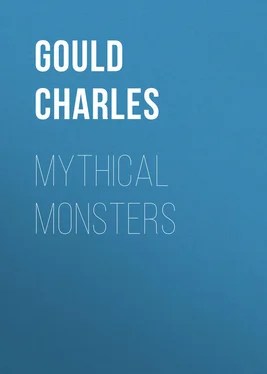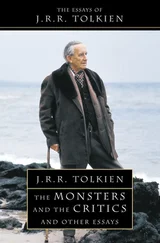Charles Gould - Mythical Monsters
Здесь есть возможность читать онлайн «Charles Gould - Mythical Monsters» — ознакомительный отрывок электронной книги совершенно бесплатно, а после прочтения отрывка купить полную версию. В некоторых случаях можно слушать аудио, скачать через торрент в формате fb2 и присутствует краткое содержание. Жанр: Мифы. Легенды. Эпос, Природа и животные, foreign_antique, foreign_prose, на английском языке. Описание произведения, (предисловие) а так же отзывы посетителей доступны на портале библиотеки ЛибКат.
- Название:Mythical Monsters
- Автор:
- Жанр:
- Год:неизвестен
- ISBN:нет данных
- Рейтинг книги:5 / 5. Голосов: 1
-
Избранное:Добавить в избранное
- Отзывы:
-
Ваша оценка:
- 100
- 1
- 2
- 3
- 4
- 5
Mythical Monsters: краткое содержание, описание и аннотация
Предлагаем к чтению аннотацию, описание, краткое содержание или предисловие (зависит от того, что написал сам автор книги «Mythical Monsters»). Если вы не нашли необходимую информацию о книге — напишите в комментариях, мы постараемся отыскать её.
Mythical Monsters — читать онлайн ознакомительный отрывок
Ниже представлен текст книги, разбитый по страницам. Система сохранения места последней прочитанной страницы, позволяет с удобством читать онлайн бесплатно книгу «Mythical Monsters», без необходимости каждый раз заново искать на чём Вы остановились. Поставьте закладку, и сможете в любой момент перейти на страницу, на которой закончили чтение.
Интервал:
Закладка:
The great majority of mythologists appear to agree in assigning a much earlier date to the Deluge, than that which has hitherto been generally accepted as the soundest interpretation of the chronological evidence afforded by the Bible.
I have never had the advantage of finding the arguments on which this opinion is based, formulated in association, although, as incidentally referred to by various authors, they appear to be mainly deduced from the references made, both by sacred and profane writers, to large populations and important cities existing subsequently to the Deluge, but at so early a date, as to imply the necessity of a very long interval indeed between the general annihilation caused by the catastrophe, and the attainment of so high a pitch of civilization and so numerous a population as their existence implies.
Philologists at the same time declare that a similar inference may be drawn from the vast periods requisite for the divergence of different languages from the parent stock, 97while the testimony of the monuments and sculptures of ancient Egypt assures us that race distinction of as marked a type as occurs at the present day existed at so early a date 98as to preclude the possibility of the derivation of present nations from the descendants of Noah within the limited period usually allowed.
These difficulties vanish, if we consider the Biblical and Chaldean narratives as records of a local catastrophe, of vast extent perhaps, and resulting in general but not total destruction, whose sphere may have embraced the greater portion of Western Asia, and perhaps Europe; but which, while wrecking the great centres of northern civilization, did not extend southwards to Africa and Egypt. 99The Deluge legends indigenous in Mexico at the date of the Spanish conquest, combining the Biblical incidents of the despatch of birds from a vessel with the conception of four consecutive ages terminating in general destruction, and corresponding with the four ages or Yugas of India, supply in themselves the testimony of their probable origin from Asia. The cataclysm which caused what is called the Deluge may or may not have extended to America, probably not. In a future page I shall enumerate a few of the resemblances between the inhabitants of the New World and of the Old indicative of their community of origin.
I refer the reader to M. Lenormant’s valuable essay 100for his critical notice on the dual composition of the account in Genesis, derived as it appears to be from two documents, one of which has been called the Elohistic and the other the Jehovistic account, and for his comparison of it with the Chaldean narrative exhumed by the late Mr. George Smith from the Royal Library of Nineveh, the original of which is probably of anterior date to Moses, and nearly contemporaneous with Abraham.
I transcribe from M. Lenormant the text of the Chaldean narrative, because there are points in it which have not yet been commented on, and which, as it appears to me, assist in the solution of the Deluge story: —
I will reveal to thee, O Izdhubar, the history of my preservation – and tell to thee the decision of the gods.
The town of Shurippak, a town which thou knowest, is situated on the Euphrates. It was ancient, and in it [men did not honour] the gods. [I alone, I was] their servant, to the great gods – [The gods took counsel on the appeal of] Anu – [a deluge was proposed by] Bel – [and approved by Nabon, Nergal and] Adar.
And the god [Êa,] the immutable lord, – repeated this command in a dream. – I listened to the decree of fate that he announced, and he said to me: – “Man of Shurippak, son of Ubaratutu – thou, build a vessel and finish it [quickly]. – By a [deluge] I will destroy substance and life. – Cause thou to go up into the vessel the substance of all that has life. – The vessel thou shalt build – 600 cubits shall be the measure of its length – and 60 cubits the amount of its breadth and of its height. – [Launch it] thus on the ocean and cover it with a roof.” – I understood, and I said to Êa, my lord: – “[The vessel] that thou commandest me to build thus, – [when] I shall do it – young and old [shall laugh at me].” – [Êa opened his mouth and] spoke. – He said to me, his servant: – “[If they laugh at thee] thou shalt say to them: [Shall be punished] he who has insulted me, [for the protection of the gods] is over me. – … like to caverns … – … I will exercise my judgment on that which is on high and that which is below … – … Close the vessel … – … At a given moment that I shall cause thee to know, – enter into it, and draw the door of the ship towards thee. – Within it, thy grains, thy furniture, thy provisions, – thy riches, thy men-servants, and thy maid-servants, and thy young people – the cattle of the field and the wild beasts of the plain that I will assemble – and that I will send thee, shall be kept behind thy door.” – Khasisatra opened his mouth and spoke; – he said to Êa, his lord: – “No one has made [such a] ship. – On the prow I will fix … – I shall see … and the vessel … – the vessel thou commandest me to build [thus] – which in … 101
On the fifth day [the two sides of the bark] were raised. – In its covering fourteen in all were its rafters – fourteen in all did it count above. – I placed its roof and I covered it. – I embarked in it on the sixth day; I divided its floors on the seventh; – I divided the interior compartments on the eighth. I stopped up the chinks through which the water entered in; – I visited the chinks and added what was wanting. – I poured on the exterior three times 3,600 measures of asphalte, – and three times 3,600 measures of asphalte within. – Three times 3,600 men, porters, brought on their heads the chests of provisions. – I kept 3,600 chests for the nourishment of my family, – and the mariners divided amongst themselves twice 3,600 chests. – For [provisioning] I had oxen slain; – I instituted [rations] for each day. – In [anticipation of the need of] drinks, of barrels and of wine – [I collected in quantity] like to the waters of a river, [of provisions] in quantity like to the dust of the earth. – [To arrange them in] the chests I set my hand to. – … of the sun … the vessel was completed. – … strong and – I had carried above and below the furniture of the ship. – [This lading filled the two-thirds.]
All that I possessed I gathered together; all I possessed of silver I gathered together; all that I possessed of gold I gathered – all that I possessed of the substance of life of every kind I gathered together. – I made all ascend into the vessel; my servants male and female, – the cattle of the fields, the wild beasts of the plains, and the sons of the people, I made them all ascend.
Shamash (the sun) made the moment determined, and – he announced it in these terms: – “In the evening I will cause it to rain abundantly from heaven; enter into the vessel and close the door.” – The fixed moment had arrived, which he announced in these terms: “In the evening I will cause it to rain abundantly from heaven.” – When the evening of that day arrived, I was afraid, – I entered into the vessel and shut my door. – In shutting the vessel, to Buzurshadirabi, the pilot, – I confided this dwelling with all that it contained.
Mu-sheri-ina-namari 102– rose from the foundations of heaven in a black cloud; – Ramman 103thundered in the midst of the cloud – and Nabon and Sharru marched before; – they marched, devastating the mountain and the plain; – Nergal 104the powerful, dragged chastisements after him; – Adar 105advanced, overthrowing before him; – the archangels of the abyss brought destruction, – in their terrors they agitated the earth. – The inundation of Ramman swelled up to the sky, – and [the earth] became without lustre, was changed into a desert.
Читать дальшеИнтервал:
Закладка:
Похожие книги на «Mythical Monsters»
Представляем Вашему вниманию похожие книги на «Mythical Monsters» списком для выбора. Мы отобрали схожую по названию и смыслу литературу в надежде предоставить читателям больше вариантов отыскать новые, интересные, ещё непрочитанные произведения.
Обсуждение, отзывы о книге «Mythical Monsters» и просто собственные мнения читателей. Оставьте ваши комментарии, напишите, что Вы думаете о произведении, его смысле или главных героях. Укажите что конкретно понравилось, а что нет, и почему Вы так считаете.











